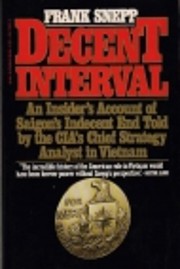

Pulse en una miniatura para ir a Google Books.
|
Cargando... Decent Interval: An Insider's Account of Saigon's Indecent Endpor Frank Snepp

Ninguno Actualmente no hay Conversaciones sobre este libro. This is a very good book. It provides a blueprint for any future attempt to create a totally FUBAR situation. Snepp was there when Saigon fell in 1975 and witnessed first hand the disregard the government who risked everything to provide the US with vital intelligence for our war effort. In the end the delay in starting the evacuation left many behind to a dismal fate. When it was over the higher ups exercised a remarkable level of butt covering. Snepp's book, which so offended the CIA that they sought to ban it, is a useful insiders account of the diplomatic side of the United State's involvement in the Vietnam War from the 'man on the ground'. Snepp, like John Paul Vann comes across neither as a left wing critic of the war, nor an enthusiastic proponent. He was instead - it appears - someone who struggled with the failure of America's good intentions and immense sacrifice to make any headway in reforming the South Vietnamese Government or protecting and improving the life of its citizens. In many ways the book is more narrative than analysis, and the authors presence at the events that it describes lends strength to this approach. Snepp does however have one great theme - the betrayal of Vietnamese who had been compromised by working with the Americans. When the fall of Saigon and South Vietnam was imminent it seemed to Snepp that the US had made no plans to assist these Vietnamese. He accuses his immediate superiors of stupidity, lethargy and indifference. Yet there is a sense that Snepp, while a skilled intelligence analysist, was somewhat naive when it came to his own Government. Snepp fails to see that the failure to make provision to evacuate the compromised Vietnamese may have been made quite deliberately at a much higher level. Snepp may have been deliberately 'left out of the loop', not only to allow deniability, but also because he was becoming known for his sympathies with the Vietnamese. It is interesting to note Snepp's approval of the successful campaign to block refugees from entering Saigon in the final weeks. Up to that point a human flood tide of refugees had disrupted defences and morale as it swept South in front of the North Vietnamese armies, themselves struggling to keep pace. Snepp never makes the connection that the US government may have made a very similar decision to keep the American-affiliated Vietnamese from reaching refuge in the US. Restricting the evacuation to US citizens simplified things, but also avoided bringing a wave of embittered (and betrayed) Vietnamese back to the US mainland where they might keep alive a debate that some in Government there wanted to forget. Snepp's rage wouldn't have been the less if he'd thought this a deliberate strategy rather than simply due to stupidity, and there's even a chance he suspected it but preferred not to paint his own Government so black. In the end Snepp inhabited a strange world as an intelligence analysist – a world of Rumsfeldt's known unknowns and unknown unknowns. Snepp comes across as sincere man; and as subsequent events played out, a man betrayed by his own country in their attempt to portray him as a traitor. An invaluable book for its description of the last hours of America in Saigon. sin reseñas | añadir una reseña
Widely regarded as a classic on the Vietnam War, Decent Interval provides a scathing critique of the CIA's role in and final departure from that conflict. Still the most detailed and respected account of America's final days in Vietnam, the book was written at great risk and ultimately at great sacrifice by an author who believed in the CIA's cause but was disillusioned by the agency's treacherous withdrawal, leaving thousands of Vietnamese allies to the mercy of an angry enemy. A quartercentury later, it remains a riveting and powerful testament to one of the darkest episodes in American history. No se han encontrado descripciones de biblioteca. |
Debates activosNingunoCubiertas populares
 Google Books — Cargando... Google Books — Cargando...GénerosSistema Decimal Melvil (DDC)959.704History and Geography Asia Southeast Asia Vietnam 1949-Clasificación de la Biblioteca del CongresoValoraciónPromedio: (3.79) (3.79)
¿Eres tú?Conviértete en un Autor de LibraryThing. |
||||||||||||||||||||||||||||||||||||||||||||||||||||||||||||||||||||||||||||||||||||||||||||||||||||||||||||||||||||||||
In the read, one can clearly tell that Snepp intended to write the story by the notes he kept of his firsthand experiences. He also uses excerpts from a North Vietnamese General’s memoirs published in 1976. As if he anticipated the book may be cause for further study, the people, planning, and some places are indexed in the back. Earning a Master’s in Internal Affairs from Columbia College, working as copywriter for CBS News, and eight years in the CIA prepares and positions the author in a unique vantage for honestly and clearly recounting events.
Told in three parts; Homecoming, The Unraveling, and Collapse, the reader has time to absorb and reflect on what has happened, tease out the ideas against what one might know of the era, and set their mind to take in the next phase. Few can walk through the trenches of such a controversial time in history and come away to objectively tell the world what has occurred in the way Frank Snepp has in this text. Gripping. Bold. Insightful. Find a sense of what it was like to be there by reading “Decent Interval.” (